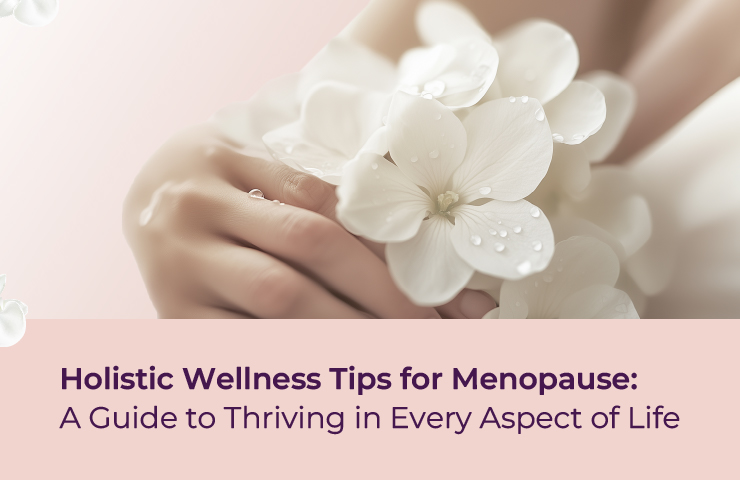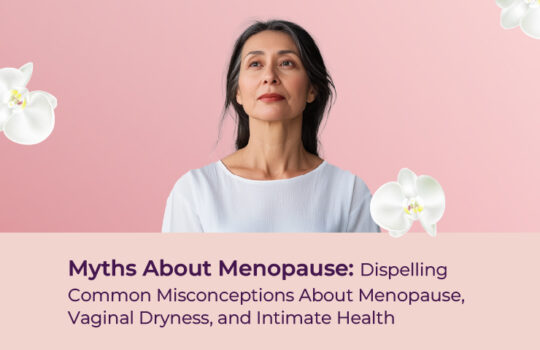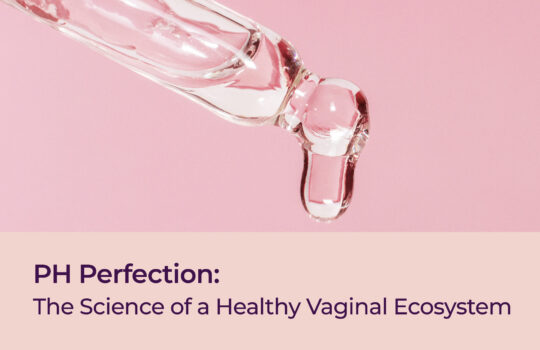Menopause is a natural and transformative phase in a woman’s life, but it can also bring physical and emotional challenges. While addressing symptoms such as hot flashes, sleep disturbances, and vaginal dryness is important, overall wellness requires a more comprehensive approach. Holistic health practices can help you navigate menopause with strength, confidence, and vitality.
This blog explores lifestyle tips—spanning nutrition, exercise, mindfulness, and self-care—to empower you during menopause, with insights on how Ceryne can support your journey to comfort and wellness.
Nutrition: Fueling Your Body for Strength and Vitality
What you eat profoundly impacts how you feel during menopause. Hormonal fluctuations during this time can affect your metabolism, bone density, and cardiovascular health. A thoughtful approach to nutrition can help manage these changes.
1. Prioritize Bone Health with Calcium and Vitamin D
As women transition through menopause, bone health becomes a significant focus. The decline in estrogen levels increases the risk of osteoporosis, making calcium and vitamin D essential allies. These nutrients work together to maintain bone density and overall skeletal strength. Here’s how you can naturally incorporate them into your diet, tailored for the Indian palate:
Calcium-Rich Foods
- Dairy Products:
- Milk: A staple in many Indian households, whether enjoyed plain, in chai, or as part of smoothies.
- Curd: Not only rich in calcium but also great for gut health. Try a bowl of curd with fresh fruits or sprinkle it with roasted cumin for added flavor.
- Paneer (Cottage Cheese): Use it in curries like palak paneer or as grilled kebabs for a protein-packed calcium boost.
- Leafy Greens:
- Spinach (Palak): A versatile ingredient for dals, parathas, or soups, loaded with calcium.
- Fenugreek Leaves (Methi): Add methi to your rotis or stir-fry them for a healthy side dish.
- Amaranth Leaves (Chaulai): Cooked as saag or mixed into dals, these greens are a calcium powerhouse.
- Nuts and Seeds:
- Almonds: Snack on a handful or blend them into almond milk.
- Sesame Seeds (Til): Use them in ladoos, tahini, or sprinkle them over salads.
- Chia Seeds: Mix into smoothies, sprinkle over yogurt, or soak overnight for a nutritious pudding.
- Millets:
- Ragi (Finger Millet): Ideal for porridge or ragi dosa, offering a significant calcium boost.
- Bajra (Pearl Millet): Perfect for rotis during winter, rich in calcium and warming.
- Dried Fruits:
- Figs (Anjeer): A sweet treat, figs can be added to smoothies, desserts, or eaten on their own.
Vitamin D-Rich Foods
- Fortified Foods:
- Many Indian brands now offer fortified milk, yogurt, and cereals. Check labels for added vitamin D.
- Seafood:
- Rohu or Hilsa Fish: Commonly available in Indian markets and perfect for curries.
- Sardines: A cost-effective, vitamin D-rich option often used in coastal cuisines.
- Egg Yolks:
- Include boiled, poached, or scrambled eggs in your meals. Egg yolks are an excellent source of vitamin D.
- Mushrooms:
- Expose locally available mushrooms like button mushrooms to sunlight for a few hours before cooking to boost their vitamin D content. Add them to stir-fries, curries, or soups.
- Sunlight:
- While food is crucial, sunlight exposure remains one of the best sources of vitamin D. Aim for 10–30 minutes of morning or late afternoon sunlight daily, particularly on arms and face, without sunscreen.
By prioritizing these nutrient-rich foods, menopause becomes a time to nourish your body and strengthen your bones, helping you embrace this new phase of life with confidence and vitality.
2. Balance Hormones Naturally
Phytoestrogens, plant compounds that mimic estrogen, can help alleviate symptoms like hot flashes.
- Sources of Phytoestrogens: Include soy products (tofu, edamame), flaxseeds, sesame seeds, and legumes.
3. Support Heart Health
With the risk of cardiovascular issues increasing after menopause, heart-healthy foods are essential:
- Healthy Fats: Opt for avocados, olive oil, nuts, seeds, and fatty fish like salmon.
- Whole Grains: Oats, quinoa, and whole wheat products can help maintain stable blood sugar levels.
4. Reduce Inflammation
Chronic inflammation can exacerbate menopause symptoms. Anti-inflammatory foods can support overall health:
- Fruits and Vegetables: Brightly colored fruits and veggies like berries, spinach, and capsicum.
- Spices: Turmeric and ginger are potent natural anti-inflammatories.
5. Stay Hydrated
Hormonal shifts can lead to dehydration, making it essential to drink plenty of water. Hydration also helps with skin elasticity, joint health, and managing bloating.
Pro Tip: Keep meals vibrant and varied. A diet rich in whole foods, healthy fats, and lean proteins, is an excellent choice for menopausal women.
Exercise: Moving Toward Strength and Balance
Physical activity during menopause does more than maintain a healthy weight—it boosts mood, improves cardiovascular health, strengthens bones, and enhances overall energy.
1. Strength Training
Weight-bearing exercises help combat the loss of muscle mass and bone density:
- Incorporate activities like resistance training, weightlifting, or bodyweight exercises twice a week.
2. Cardio for Heart Health
Aerobic exercises improve cardiovascular health and combat fatigue:
- Activities like brisk walking, cycling, swimming, or dancing for 30 minutes a day are highly effective.
3. Flexibility and Balance
Yoga and Pilates are excellent for improving flexibility, balance, and posture while reducing stress:
- Yoga Benefits: Poses like Downward Dog and Warrior II strengthen muscles and calm the mind.
- Pilates Benefits: Strengthens the core, which can alleviate back pain often associated with menopause.
4. Low-Impact Options
If joint discomfort is a concern, consider low-impact activities like water aerobics or using an elliptical machine.
Mindfulness Practices: Cultivating Emotional Resilience
The emotional challenges of menopause can be as significant as the physical ones. Mindfulness and relaxation techniques are powerful tools for emotional well-being.
1. Meditation
Daily meditation can help reduce anxiety, improve focus, and enhance emotional resilience:
- Start with 5-10 minutes a day, focusing on deep breathing or guided meditation apps.
2. Breathing Exercises
Controlled breathing techniques can help manage hot flashes and reduce stress:
- Box Breathing: Inhale for 4 counts, hold for 4 counts, exhale for 4 counts, and pause for 4 counts before repeating.
3. Journaling
Writing down your thoughts can provide clarity and perspective, especially during emotional highs and lows:
- Reflect on gratitude, goals, or daily observations.
4. Visualization Techniques
Create a mental image of your desired state of well-being, focusing on strength, confidence, and joy. Visualization can reinforce positivity and calm.
Pro Tip: Incorporate mindfulness into everyday activities like cooking, walking, or sipping tea, bringing your attention fully to the present moment.
Self-Care and Intimate Health: Prioritizing Comfort and Confidence
Menopause is a time to prioritize yourself. Intimate health is a key aspect of overall wellness, yet it’s often overlooked or stigmatized.
1. Addressing Vaginal Dryness
Vaginal dryness is a common symptom of menopause, often caused by reduced estrogen levels. This can lead to discomfort, irritation, and intimacy challenges.
Ceryne Ultra Pure Lipocream is formulated to restore comfort and hydration, empowering women to feel confident and at ease.
- Ultra Pure Ingredients: Mimics the natural biology of the vagina to maintain a healthy pH and microbiome.
- Ease of Use: Designed for everyday comfort and confidence.
2. Sleep Hygiene
Sleep disturbances are common during menopause due to night sweats, anxiety, or hormonal changes:
- Create a bedtime routine with calming activities like reading, stretching, or taking a warm bath.
- Maintain a cool, dark bedroom environment for optimal rest.
3. Skincare Rituals
Menopause-related hormonal changes can affect skin elasticity and hydration:
- Invest in skincare products with hyaluronic acid, ceramides, and retinoids to nourish and rejuvenate your skin.
Building a Supportive Community
You don’t have to navigate menopause alone. Connecting with others who understand your experiences can be incredibly empowering.
1. Join Menopause Support Groups
Online and in-person groups offer a space to share experiences, ask questions, and gain insights.
2. Foster Friendships
Cultivate relationships with friends who uplift and encourage you, celebrating this new chapter together.
3. Seek Professional Guidance
Consult healthcare providers to create a personalized wellness plan.
Embracing a New Chapter
Menopause is not the end of something—it’s the beginning of a powerful new chapter. By adopting a holistic approach to wellness, you can navigate this transition with confidence and grace.
Ceryne is here to support you, offering more than intimate care—providing a partner in your journey toward comfort, empowerment, and well-being. Let’s redefine menopause together, not as a limitation but as a launchpad for living boldly and beautifully.
Because your prime isn’t behind you—it’s right here, and it’s yours to own.






